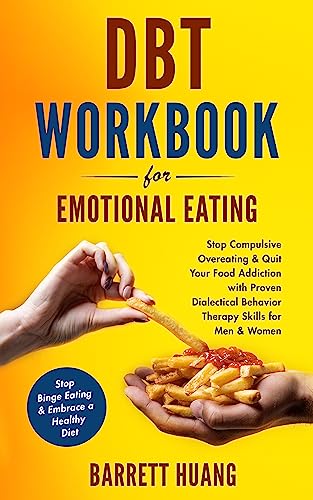Don’t you love it when someone shares a book title with you, thinking you may love it as well? I am much more motivated to get a book based upon personal testimony. And what if you get to meet the author himself to get an inside glimpse of why he wrote it?
That’s what we’ve got today!
Barrett Huang just released a new workbook whose title caught my eye, DBT Workbook For Emotional Eating: Stop Compulsive Overeating and Quit Your Food Addiction with Proven Dialectical Behavior Therapy Skills for Men and Women.
This DBT term was new to me. Most of us have heard about Cognitive Behavioral Therapy (CBT), and if you have attended a therapy session, chances are it was based on the precepts of CBT, which focuses on changing problematic thinking. Among other things, this newer therapy, DBT, is best known for its success with eating disorders.
Mission Harbor Behavioral Therapy
After reading the sample, I was sold on purchasing this helpful guide. Our philosophies of starting with how we think about ourselves and how we perceive our circumstances were perfectly aligned. Was I a proponent of DBT without knowing it?
There was something else that lit up memories in my mind as I read about his approach to achieving a healthier lifestyle – it reminded me of Noom.
I used Noom a few years ago as an accountability buddy for losing the weight I had gained as a caregiver – even those who write about health sometimes need a helping hand. Many of my approaches and exercises felt familiar and brought back the sense of calm control I had over my eating through my previous training.
According to this review, Noon Diet Review, Noom does use DBT.
One thing I did not have with Noom, was a workbook. I love having a workbook component to my learning, and Barrett Huang’s latest book checks off all the boxes for building personal skills and mindsets.
He reveals his approach to weight loss and overall health through telling his own story and progresses to the evolution of his successful methods. I could see the familiar patterns with his weight loss struggle, reflected in so many people I know or have met.
So inspired by his workbook, I reached out to Barrett Huang, and he quickly accepted my invitation to share a little bit extra with foodtalk4you readers. He writes:
“I like that Dialectical Behaviour Therapy (DBT) focuses on accepting your thoughts, feelings, and actions while also striving to improve them. Many therapies tend to place excessive emphasis on fixing issues rather than taking a step back and accepting things as they are.
DBT can be applied to various aspects beyond just emotional eating, including anxiety, depression, and BPD, to name a few. Emotional eating often serves as a coping mechanism to deal with uncomfortable emotions.
Some of the skills DBT teaches include:
Mindfulness: This helps you develop greater mindfulness and presence in the moment. You learn to appreciate the things you have and avoid getting caught in a cycle of overthinking.
Distress tolerance: You learn effective ways to cope with uncomfortable emotions and situations without resorting to impulsive behaviors that could be harmful.
Emotion Regulation: This skill focuses on understanding and managing your emotions more effectively. You learn how to label and handle your emotions, identify triggers, and employ coping techniques.
Interpersonal Effectiveness: A significant aspect, this skill helps you enhance your communication and relationship-building abilities. It involves expressing your boundaries, feelings, thoughts and needs to others.
Hence, DBT offers a balanced approach by addressing both acceptance and change, rather than focusing solely on one aspect. Additionally, I find DBT to be highly adaptable and capable of being tailored to various situations. Ultimately, you acquire the tools to become a more resilient and adaptable individual, capable of navigating life’s challenges.
I aimed to create a DBT workbook that is not only easy to follow and implement but also interactive. This workbook is crafted with personal stories and practical worksheets and exercises. Its approach is designed to assist readers in transforming their relationship with food for the better. Drawing from impactful personal anecdotes and incorporating well-established DBT lessons for emotional well-being and stress management, this workbook provides the tools needed to embark on a journey of lasting change.”
If this sounds like something that would help you or someone you know, please check out his book using the links provided. You can discover more about Barrett Huang and his many other books, mostly aimed at helping children and adults using DBT, by going to his website.
In health –
Deidre
Sharing this article and resource is easy – just click on the options under the MORE button below.










